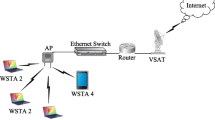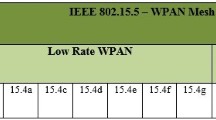Abstract
The IEEE 802.11e medium access control (MAC) layer protocol is an emerging standard to support quality of service (QoS) in 802.11 wireless networks. Some recent work shows that the 802.11e hybrid coordination function (HCF) can improve significantly the QoS support in 802.11 networks. A simple HCF referenced scheduler has been proposed in the 802.11e which takes into account the QoS requirements of flows and allocates time to stations on the basis of the mean sending rate. As we show in this paper, this HCF referenced scheduling algorithm is only efficient and works well for flows with strict constant bit rate (CBR) characteristics. However, a lot of real-time applications, such as videoconferencing, have some variations in their packet sizes, sending rates or even have variable bit rate (VBR) characteristics. In this paper we propose FHCF, a simple and efficient scheduling algorithm for 802.11e that aims to be fair for both CBR and VBR flows. FHCF uses queue length estimations to tune its time allocation to mobile stations. We present analytical model evaluations and a set of simulations results, and provide performance comparisons with the 802.11e HCF referenced scheduler. Our performance study indicates that FHCF provides good fairness while supporting bandwidth and delay requirements for a large range of network loads.
Similar content being viewed by others
References
IEEE 802.11 WG: IEEE Std 802.11-1999, Part 11, Wireless LAN MAC and physical layer specifications. Reference number ISO/IEC 8802-11:1999 (E), (1999).
Q. Ni, L. Romdhani and T. Turletti, A survey of QoS enhancements for IEEE 802.11 wireless LAN, Wiley Journal of Wireless Communications and Mobile Computing (JWCMC), John Wiley & Sons Publisher, 4 (5) (2004) 547–566.
IEEE 802.11 WG: IEEE 802.11e/D4.1, Wireless MAC and physical layer specifications: MAC enhancements for QoS (Feb. 2003).
S. Mangold, S. Choi, P. May, et al., IEEE 802.11e wireless LAN for Quality of Service. Proceeding of European Wireless 1 (2002) 32–39.
A. Grilo, M. Macedo and M Nunes, A scheduling algorithm for QoS support in IEEE 802.11e networks, IEEE Communication Magazine 10 (2003) 36–43.
P. Garg, R. Doshi, R. Greene, et al., Using IEEE 802.11e MAC for QoS over wireless. IEEE IPCCC (2003).
S. McCanne, and V. Jacobson, VIC: A flexible framework for packet video, ACM Multimedia (1995).
ITU-T Recommendation H.261, Video codec for audiovisual services at p×64 kb/s. (1993).
P. Ansel, Q. Ni and T. Turletti, FHCF: A fair scheduling scheme for 802.11e WLAN, INRIA Research Report No. 4883, July 2003. Implementation and NS simulation codes available from http://www-sop.inria.fr/planete/qni/fhcf/
ISO/IEC JTC1/SC29/WG11: MPEG4 coding of audio visual objects: Visual (1998).
P. M. Soni, and A. Chockalingam, Performance analysis of UDP with energy efficient link layer on Markov fading channels, IEEE Transactions on Wireless Communications 1 (2002).
R. Jain, The Art of Computer Systems Performance Analysis (John Wiley & Sons publisher, 1991).
J. Jacod, and P. Protter, Probability Essentials. (Springer Publisher, 2003).
Author information
Authors and Affiliations
Corresponding author
Additional information
Pierre Ansel received a multidisciplinary in-depth scientific training in different fields such as Pure and Applied Mathematics, Physics, Mechanics, Computer Science and Economics from the Ecole Polytechnique, Palaiseau, France. Then, he joined the Ecole Nationale Superieure des Telecommunications, Paris, France in 2005 where he went further into electronics, databases, computer network security and high speed networks. He received a multidisciplinary master of sciences degree and an additional master of sciences degree in telecommunications in 2005. He did a summer internship in 2003 in INRIA, Sophia Antipolis, France where he worked on the Quality of Service in 802.11 networks at Planete Group, France. Then in 2004, he joined France Telecom R&D, Issy-les-Moulineaux, France to work on Intranet Security issues. He designed a WiFi security supervision architecture based on WiFi Intrusion Detection Sensors. He is currently a French civil servant and belongs to the French Telecommunications Corps.
Qiang Ni received the B.Eng., M.Sc. and Ph.D. degrees from Hua Zhong University of Science and Technology (HUST), Wuhan City, China in 1993, 1996 and 1999 respectively. He is currently a faculty member in the Electronic and Computer Engineering Division,School of Engineering and Design, Brunel University, West London, U.K. Between 2004 and 2005 he was a Senior Researcher at the Hamilton Institute, National University of Ireland, Maynooth. From 1999 to 2001, he was a post-doctoral research fellow in the multimedia and wireless communication laboratory, HUST, China. He visited and conducted research at the wireless and networking group of Microsoft Research Asia Lab during the year of 2000. From Sept. 2001 until may 2004, he was a research staff member at the Planète group of INRIA Sophia Antipolis France. Since 2002, he has been active as a voting member at the IEEE 802.11 wireless LAN standard working group. His current research interests include communication protocol design and performance analysis for wireless networks, cross-layer optimizations, vertical handover and mobility management in mobile wireless networks, and adaptive multimedia transmission over hybrid wired/wireless networks. He has authored /co-authored over 40 international journal/conference papers, book chapters, and standard drafts in this field. He is a member of IEEE. E-mail: Qiang.Ni@ieee.org
Thierry Turletti received the M.S. (1990) and the Ph.D. (1995) degrees in computer science both from the University of Nice – Sophia Antipolis, France. He has done his PhD studies in the RODEO group at INRIA Sophia Antipolis. During the year 1995–96, he was a postdoctoral fellow in the Telemedia, Networks and Systems group at LCS, MIT. He is currently a research scientist at the Planete group at INRIA Sophia Antipolis. His research interests include multimedia applications, congestion control and wireless networking. Dr. Turletti currently serves on the Editorial Board of Wireless Communications and Mobile Computing.
Rights and permissions
About this article
Cite this article
Ansel, P., Ni, Q. & Turletti, T. FHCF: A Simple and Efficient Scheduling Scheme for IEEE 802.11e Wireless LAN. Mobile Netw Appl 11, 391–403 (2006). https://doi.org/10.1007/s11036-006-5191-z
Published:
Issue Date:
DOI: https://doi.org/10.1007/s11036-006-5191-z




